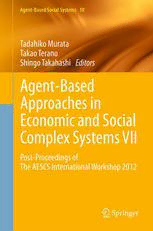Table Of ContentAgent-Based Social Systems 10
Tadahiko Murata
Takao Terano
Shingo Takahashi Editors
Agent-Based
Approaches in
Economic and Social
Complex Systems VII
Post-Proceedings of
The AESCS International Workshop 2012
Agent-Based Social Systems
Volume 10
Editor in Chief:
HiroshiDeguchi,Yokohama,Japan
Series Editors:
Shu-HengChen,Taipei,Taiwan,ROC
ClaudioCioffi-Revilla,Fairfax,USA
NigelGilbert,Guildford,UK
HajimeKita,Kyoto,Japan
TakaoTerano,Yokohama,Japan
Forfurthervolumes:
http://www.springer.com/series/7188
ABSS–Agent-Based Social Systems
Thisseriesisintendedtofurtherthecreationofthescienceofagent-basedsocialsystems,a
field that is establishing itself as a transdisciplinary and cross-cultural science. The series
will cover a broad spectrum of sciences, such as social systems theory, sociology, busi-
nessadministration, management information science, organization science, computational
mathematicalorganizationtheory,economics,evolutionaryeconomics,internationalpolitical
science,jurisprudence,policyscience,socioinformationstudies,cognitivescience,artificial
intelligence, complex adaptive systems theory, philosophy of science, and other related
disciplines.
Theserieswillprovideasystematicstudyofthevariousnewcross-culturalarenasofthe
human sciences. Such an approach has been successfully triedseveral timesinthe history
of themodern science of humanities and systems and has helped to create such important
conceptual frameworks and theories as cybernetics, synergetics, general systems theory,
cognitivescience,andcomplexadaptivesystems.
Wewanttocreateaconceptualframeworkanddesigntheoryforsocioeconomicsystems
ofthetwenty-firstcenturyinacross-culturalandtransdisciplinarycontext.Forthispurpose
we plan to take an agent-based approach. Developed over the last decade, agent-based
modeling is a new trend within the social sciences and is a child of the modern sciences
of humanities and systems. In this series the term “agent-based” is used across a broad
spectrumthatincludes not onlytheclassical usageof thenormative andrationalagent but
also an interpretive and subjective agent. We seek the antinomy of the macro and micro,
subjectiveandrational,functionalandstructural,bottom-upandtop-down,globalandlocal,
and structure and agency within the social sciences. Agent-based modeling includes both
sidesoftheseopposites.“Agent”isourgroundingformodeling;simulation,theory,andreal-
worldgroundingarealsorequired.
As an approach, agent-based simulation is an important tool for the new experimental
fields of the social sciences; it can be used to provide explanations and decision support
for real-world problems, and its theories include both conceptual and mathematical ones.
A conceptual approach is vital for creating new frameworks of the worldview, and the
mathematicalapproachisessentialtoclarifythelogicalstructureofanynewframeworkor
model. Exploration of several different ways of real-world grounding is required for this
approach. Other issues to be considered in the series include the systems design of this
century’sglobalandlocalsocioeconomicsystems.
EditorinChief
HiroshiDeguchi
ChiefofCenterforAgent-BasedSocialSystemsSciences(CABSSS)
TokyoInstituteofTechnology
4259Nagatsuta-cho,Midori-ku,Yokohama226-8502,Japan
SeriesEditors
Shu-HengChen,Taipei,Taiwan,ROC
ClaudioCioffi-Revilla,Fairfax,USA
NigelGilbert,Guildford,UK
HajimeKita,Kyoto,Japan
TakaoTerano,Yokohama,Japan
Tadahiko Murata • Takao Terano
Shingo Takahashi
Editors
Agent-Based Approaches
in Economic and Social
Complex Systems VII
Post-Proceedings of The AESCS
International Workshop 2012
123
Editors
TadahikoMurata TakaoTerano
Professor Professor
DepartmentofInformatics DepartmentofComputationalIntelligence
KansaiUniversity andSystemScience
2-1-1Ryozenji-cho,Takatsuki TokyoInstituteofTechnology
Osaka569-1095,Japan 4259Nagatsuta-cho,Midori-ku,Yokohama
Kanagawa226-8502,Japan
ShingoTakahashi
Professor
DepartmentofIndustrialandManagement
SystemEngineering
WasedaUniversity
3-4-1Okubo,Shinjuku-ku
Tokyo169-8555,Japan
ISSN1861-0803
ISBN978-4-431-54278-0 ISBN978-4-431-54279-7(eBook)
DOI10.1007/978-4-431-54279-7
SpringerTokyoHeidelbergNewYorkDordrechtLondon
LibraryofCongressControlNumber:2013934222
©SpringerJapan2013
Thisworkissubjecttocopyright.AllrightsarereservedbythePublisher,whetherthewholeorpartof
thematerialisconcerned,specificallytherightsoftranslation,reprinting,reuseofillustrations,recitation,
broadcasting,reproductiononmicrofilmsorinanyotherphysicalway,andtransmissionorinformation
storageandretrieval,electronicadaptation,computersoftware,orbysimilarordissimilarmethodology
nowknownorhereafterdeveloped.Exemptedfromthislegalreservationarebriefexcerptsinconnection
with reviews or scholarly analysis or material supplied specifically for the purpose of being entered
and executed on a computer system, for exclusive use by the purchaser of the work. Duplication of
this publication or parts thereof is permitted only under the provisions of the Copyright Law of the
Publisher’slocation,initscurrentversion,andpermissionforusemustalwaysbeobtainedfromSpringer.
PermissionsforusemaybeobtainedthroughRightsLinkattheCopyrightClearanceCenter.Violations
areliabletoprosecutionundertherespectiveCopyrightLaw.
Theuseofgeneraldescriptivenames,registerednames,trademarks,servicemarks,etc.inthispublication
doesnotimply,evenintheabsenceofaspecificstatement,thatsuchnamesareexemptfromtherelevant
protectivelawsandregulationsandthereforefreeforgeneraluse.
While the advice and information in this book are believed to be true and accurate at the date of
publication,neithertheauthorsnortheeditorsnorthepublishercanacceptanylegalresponsibilityfor
anyerrorsoromissionsthatmaybemade.Thepublishermakesnowarranty,expressorimplied,with
respecttothematerialcontainedherein.
Printedonacid-freepaper
SpringerispartofSpringerScience+BusinessMedia(www.springer.com)
Preface
Recentlytheworldofsocialscienceshasbeenchangingrapidly.Manyresearchers
collaboratively confront critical issues in social and economic problems. These
researcherscomenotonlyfromstandarddisciplinesin the socialsciencessuchas
economics, political science, sociology, and others but also from natural science
fields such as physics, mathematics, and computer science. This interdisciplinary
researchnowattractsanincreasingnumberofresearchersandleadsthemtoinitiate
new series of conferences and to establish new academic organizations. One of
themistheInternationalWorkshoponAgent-BasedApproachesinEconomicand
Social Complex Systems (AESCS) organized by the Pan-Asian Association for
Agent-basedApproachinSocialSystemsSciences(PAAA).ThefirstfiveAESCS
workshops were held in Shimane (2001), Tokyo (2002), Kyoto (2004), Tokyo
(2005, 2007), and Taipei (2009). Since 2006, PAAA has sponsored the biennial
WorldCongressonSocialSimulation(WCSS)withtheEuropeanSocialSimulation
Association (ESSA) and the Computational Social Science Society of America
(CSSSA).TheyheldtheirconferencesinKyoto(2006),Fairfax(2008),andKassel
(2010).Followingtheseassemblies,PAAAhaditsbiennialworkshopAESCS2012
atKansaiUniversity,Osaka,Japan,inthebeginningof2012.
AtAESCS2012,wehad24presentationsonJanuary17and18,2012.Inaddition
to these regular presentations, a keynote speech was delivered by Alan Kirman
(Aix-Marseille University, France) on the topic “Can Artificial Economies Help
Up Understand Real Economics?” As in the previous events hosted by PAAA,
we also prepared a post-conference publication to archive selected papers from
the conferenceproceedings.Seventeenpaperswere selected to beincludedin this
volume after the reviewing process with at least three referees. These seventeen
papers are grouped into two parts: Fundamentals of Agent-Based Modeling and
ApplicationsofAgent-BasedModeling.Thepapersinthefirstparttrytoestablish
or construct basic agent-based models, and those in the second part apply agent-
basedmodelstoreal-worldproblemstoshowtheireffectiveness.
v
vi Preface
Wehopethisvolumewillprovidethereaderwithstate-of-the-arttechniquesand
conceptsfor an agent-basedapproach.We heartily invite you to join this growing
and exciting area and contribute to the flourishing developmentof computational
socialsciences.
TadahikoMurata
TakaoTerano
ShingoTakahashi
Editors,AESCS2012Post-Proceedings
Committee Members of AESCS2012
GeneralChair
TakaoTerano,TokyoInstituteofTechnology,Japan
WorkshopChair
TadahikoMurata,KansaiUniversity,Japan
OrganizingCommitteeChair
ShingoTakahashi,WasedaUniversity,Japan
OrganizingCommitteeMembers
HiroshiDeguchi,TokyoInstituteofTechnology,Japan
ReikoHishiyama,WasedaUniversity,Japan
ManabuIchikawa,TokyoInstituteofTechnology,Japan
HajimeKita,KyotoUniversity,Japan
YusukeKoyama,TokyoInstituteofTechnology,Japan
HiroyukiMatsui,KyotoUniversity,Japan
TakashiYamada,TokyoInstituteofTechnology,Japan
Sponsors
Pan-Asian Association for Agent-based Approach in Social Systems
Sciences(PAAA)
KansaiUniversity
TheSocietyforInstrumentandControlEngineers
vii
Contents
PartI FundamentalsofAgent-BasedModeling
Agent-BasedModelingandSimulationValidationbyScenario
Analysis ........................................................................... 3
YusukeGotoandShingoTakahashi
Aspiration-BasedLearningtoBalanceExplorationandExploitation
inOrganizationalLearning..................................................... 17
ManahanSiallagan,HiroshiDeguchi,andManabuIchikawa
Agent-BasedSimulationofDiversityandOrganizationalPerformance... 31
SatoshiTakahashi,TomomiKobayashi,MasaakiKunigami,
TakashiYamada,GakuYamamoto,AtsushiYoshikawa,
andTakaoTerano
ConfiguringAgents’AttributeswithSimulatedAnnealing................. 45
ShunsukeHara,HajimeKita,KokoloIkeda,andMasahiroSusukita
MoneyEmergenceonaNetworkTopology ................................... 61
MarioPaolucci
TheAgent-BasedDiffusionModel:SimulatingInformative
andNormativeEffectsonConsumerNetworks .............................. 73
MuneyoshiSaitoandSetsuyaKurahashi
Agent-BasedSimulationUsingaModelofNetworkFormation............ 85
MasatoraDaitoandHisashiKojima
Firms’InteractioninaScale-FreeTradeNetworkandPrices
Dynamics.......................................................................... 99
OscarAlonsoandHiroshiDeguchi
AnalysisandModelingofCustomer-PerceivedValueofMedical
InsuranceProducts .............................................................. 115
YokoIshino
ix

